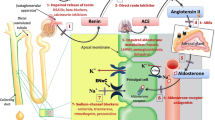Summary
Drug-induced hypokalaemia is a widespread problem in the elderly that can be caused by many therapeutically useful substances, the most common of which are diuretics. In certain classes of patients (e.g. those with acute myocardial infarction, with congestive heart failure receiving digitalis, or with cirrhosis), iatrogenic hypokalaemia is an established risk factor. In patients with hypertension who have no underlying heart disease or liver disease, the use of diuretics may lead to worsened glucose tolerance and cardiac arrythmias. There is also evidence for an increased risk of sudden cardiac death.
Similar content being viewed by others
References
Barden TP, Peter JB, Merkatz IR. Ritodrine hydrochloride: a betamimetic agent for use in preterm labor. I. Pharmacology, clinical history, adminsitration, side effects, and safety. Obstetrics and Gynecology 56: 1–6, 1980
Bengtsson C, Blohme G, Lapidus L. Do antihypertensive drugs precipitate diabetes? British Medical Journal 289: 1495–1497, 1984
Berglund G, Andersson O, Widgren B. Low-dose antihypertensive treatment with a thiazide diuretic is not diabetogenic. A 10 year controlled trial with bendroflumethiazide. Acta Medica Scandinavica 220: 419–424, 1986
Brown MJ, Brown DC, Murphy MB. Hypokalemia from beta2-receptor stimulation by circulating epinephrine. New England Journal of Medicine 309: 1414–1419, 1983
Cort JH, Matthews HL. Potassium deficiency in congestive heart failure: three cases with hyponatremia, including results of potassium replacement in one case. Lancet 1: 1202–1206, 1954
Dyckner T, Wester PO, Widman L. Amiloride prevents thiazide-induced intracellular potassium and magnesium losses. Acta Medica Scandinavica 224: 25–30, 1988
Fukuchi S, Hanata M, Takahashi H. The relationship between vascular reactivity and extracellular potassium. Tohoku Journal of Experimental Medicine 85: 181–191, 1965
Gifford RW. A guide to the practical use of diuretics. Journal of the American Medical Association 235: 1890–1983, 1976
Halevy J, Gunsherowitz M, Rosenfield JB. Life-threatening hypokalemia in hospitalized patients. Mineral and Electrolyte Metabolism 14: 163–166, 1988
Helderman JH, Elahi D, Andersen DK, Raizes GS, Tobin JD, et al. Prevention of the glucose intolerance of thiazide diuretics by maintenance of body potassium. Diabetes 32: 106–111, 1983
Hermansen K, Schmitz O, Mogensen CE. Effects of a thiazide diuretic (hydroflumethiazide) and a loop diuretic (bumetanide) on the endocrine pancreas: studies in vitro. Metabolism 34: 784–789, 1985
Holland OB. Mild hypokalemia in non-edematous, non-digitalized patients: the case for routinely normalizing serum potassium. In Narins RG (Ed.) Controversies in nephrology and hypertension, pp. 345–358, Churchill Livingstone, New York, 1984
Holland OB. Potassium loss, ventricular irritability, and the risk of sudden death in hypertensive patients. Drugs 31 (Suppl. 4): 78–84, 1986
Holland OB, Gomez-Sanchez C, Kuhnert L, Poindexter C, Pak CYC. Antihypertensive comparison of furosemide with hydrochlorothiazide for black patients. Archives of Internal Medicine 139: 1365–1370, 1979
Holland OB, Kuhnert LV, Campbell WB, Anderson RJ. Synergistic effect of captopril with hydrocholorothiazide for the treatment of low-renin hypertensive black patients. Hypertension 5: 235–239, 1983
Holland OB, Kuhnert LV, Pollard J, Padia M, Anderson RJ, et al. Ventricular ectopic activity with diuretic therapy. American Journal of Hypertension 1: 380–385, 1988
Holland OB, Nixon JV, Kuhnert L. Diuretic-induced ventricular ectopic activity. American Journal of Medicine 70: 762–768, 1981
Hollifield JW, Slaton PE. Thiazide diuretics, hypokalemia and cardiac arrhythmias. Acta Medica Scandinavica 647 (Suppl.): 67–73, 1981
Iacobellis M, Muntwyler E, Griffin GE. Kidney glutaminase and carbonic anhydrase activity and tissue electrolyte composition in potassium-deficient dogs. American Journal of Physiology 1983: 395–400, 1995
Jacobs DB, Mookerjee BK, Jung CY. Furosemide inhibits glucose transport in isolated rat adipocytes via direct inactivation of carrier proteins. Journal of Clinical Investigation 74: 1679–1685, 1984
Knochel JP. Diuretic induced hypokalemia. American Journal of Medicine 77: 18–27, 1984
Madias JE, Madias NE, Gavras HP. Nonarrhythmogenicity of diuretic-induced hypokalemia. Its evidence in patients with uncomplicated hypertension. Archives of Internal Medicine 144: 2171–2176, 1984
Majid PA, Meeran SB. Insulin and glucose in the treatment of heart failure. Lancet 2: 937–941, 1972
Multiple Risk Factor Intervention Trial Research Group. Multiple risk factor intervention trial. Risk factor changes and mortality results. Journal of the American Medical Association 248: 1465–1477, 1982
Nachmansohn D, John HM. Studies on choline acetylase: I. Effects of amino acids on the dialyzed enzyme. Inhibition by α-keto acids. Journal of Biological Chemistry 158: 157–171, 1945
Nardone DA, McDonald WJ, Girard DE. Mechanisms in hypokalemia: clinical correlation. Medicine 57: 435–446, 1978
Nordrehaug JE, Johannessen KA, Von der Lippe G. Serum potassium concentration as a risk factor of ventricular arrhythmias early in acute myocardial infarction. Circulation 71: 645–649, 1985
Paice B, Paterson KR, Onyanga-Omara F. Record linkage study of hypokalemia in hospitalized patients. Postgraduate Medicine 62: 187–191, 1980
Papademetriou V, Burris JF, Notargiacoma A, Fletcher RD, Freis ED. Thiazide therapy is not a cause of arrhythmia in patients with systemic hypertension. Archives of Internal Medicine 148: 1272–1276, 1988
Reid WD, Laragh JH. Sodium and potassium intake, blood pressure, and pressor response to angiotensin. Proceedings of the Society for Experimental Biology and Medicine 120: 26–29, 1965
Singh BN, Collet JT, Chew CYC. New perspectives in the pharmacological therapy of cardiac arrhythmia. Progress in Cardiovascular Diseases 22: 243–301, 1980
Welt LG, Hollander Jr W, Blythe WB. The consequences of potassium depletion. Journal of Chronic Diseases 11: 213–254, 1960
Wilkinson PR, Hesp R, Issler H, Raftery EB. Total body and serum potassium during prolonged thiazide therapy for essential hypertension. Lancet 1: 759–762, 1975
Woods JW, Welt LG, Hollander W. Susceptibility of rats to experimental pyelonephritis following recovery from potassium depletion. Journal of Clinical Investigation 39: 28–33, 1959
Author information
Authors and Affiliations
Rights and permissions
About this article
Cite this article
Isaac, G., Holland, O.B. Drug-Induced Hypokalaemia. Drugs & Aging 2, 35–41 (1992). https://doi.org/10.2165/00002512-199202010-00005
Published:
Issue Date:
DOI: https://doi.org/10.2165/00002512-199202010-00005




